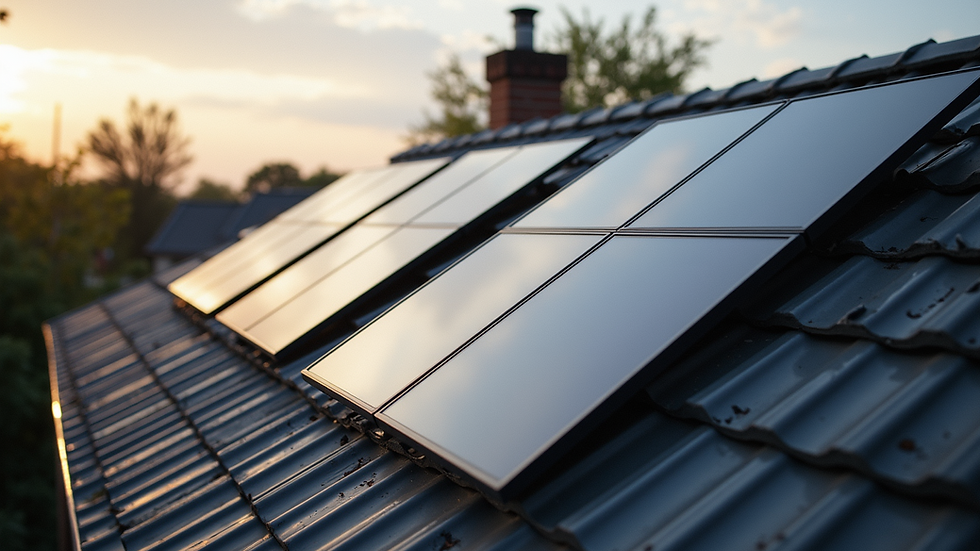Common Hurdles in Adopting Solar Energy Solutions
- Arundel Kramer
- Apr 21, 2025
- 4 min read
The shift toward renewable energy has gained momentum, with solar energy standing out as a frontrunner. As more individuals and businesses recognize the benefits of going solar, many face obstacles that can hinder their transition. Understanding these hurdles is crucial to overcoming them and taking full advantage of solar energy solutions.
Benefits of Solar Energy
Before diving into the challenges, it is essential to acknowledge why solar energy is a worthwhile investment. Solar energy is clean, renewable, and reduces greenhouse gas emissions. According to the International Energy Agency (IEA), solar power has the potential to supply a significant portion of global energy needs. In addition to environmental benefits, it can lead to substantial cost savings on electricity bills.
As technology improves, solar panels have become more efficient, making them an appealing option for many homes. Moreover, government incentives and rebates further encourage the adoption of solar energy. However, alongside these benefits come several challenges that potential users must navigate.

Financial Concerns in Solar Energy Adoption
One of the most significant hurdles in adopting solar energy solutions is financial. The upfront cost of purchasing and installing solar panels can be perceived as prohibitive, particularly for homeowners and small businesses. According to a report from the U.S. Department of Energy, the average cost of residential solar panel installations can range from $15,000 to $30,000 before any incentives.
While financing options such as loans and leases can make solar energy more accessible, these options come with their own risks and complexities. Some homeowners may feel overwhelmed by the long-term financial commitment. To mitigate these concerns, potential buyers should consider the following:
Research Available Incentives: Many federal and state programs offer tax credits and rebates that can cut costs significantly.
Compare Financing Options: Weighing the benefits of various loan structures and lease arrangements can lead to better financial decisions.
Conduct Cost-Benefit Analyses: Analyzing potential savings on energy bills in conjunction with installation costs can clarify the long-term value of going solar.

What is the biggest obstacle to solar energy?
Another considerable challenge faced by potential solar energy adopters is the perception of inefficiency and reliability. Many people worry that solar panels won’t produce enough energy, particularly in areas with variable sunlight or during winter months. This concern can deter individuals from investing in solar technology.
In reality, solar energy systems can be designed to meet specific needs, even in less sunny locations. Here are some solutions to tackle these concerns:
Assess Sunlight Exposure: Homeowners should evaluate their property’s exposure to sunlight before installation. Professional assessments can maximize energy capture.
Explore Battery Storage Options: Pairing solar panels with battery storage can ensure a steady power supply, even during cloudy days or at night.
Stay Updated on Technology Advances: As technology improves, newer solar panels may offer enhanced efficiency and performance, making them more appealing in various climates.

Regulatory Challenges Around Solar Energy
Regulations and local policies can also pose significant barriers to adopting solar energy solutions. Zoning restrictions, permitting processes, and interconnection rules can complicate and delay installations. Some homeowners may face challenges when seeking permission from homeowner associations (HOAs) or local governments.
To navigate these regulatory challenges effectively, consider these steps:
Understand Local Policies: Research local laws and regulations regarding solar energy systems, including permitting processes and any restrictions set by HOAs.
Engage with Local Authorities: Working closely with local regulators can provide clarity on requirements and potentially expedite the permitting process.
Stay Informed About Changes: Regulatory environments can change. Staying updated on new laws or incentives can be beneficial.
Lack of Awareness and Information
Another serious hurdle to adopting solar energy is the lack of awareness and accurate information. Many potential adopters simply do not understand how solar energy works or what the installation process involves. Misconceptions about solar technologies can create unnecessary hesitations.
To combat this lack of awareness, individuals can take proactive steps, such as:
Educating Themselves: Numerous online resources and local workshops provide information on solar energy systems, costs, and installation procedures.
Seeking Expert Advice: Consulting with solar energy providers or independent experts can yield tailored advice that addresses specific concerns.
Networking with Solar Users: Speaking with other homeowners who have made the switch can provide firsthand insights and help demystify the adoption process.
Installation and Maintenance Challenges
Finally, the installation and ongoing maintenance of solar energy systems present additional hurdles. The installation process can be lengthy, and homeowners may face unexpected complications during setup. Furthermore, maintenance and upkeep are essential to ensure efficient operation over time.
Here are some tips for managing installation and maintenance challenges:
Choose Reputable Installers: Research qualified solar installation companies, read reviews, and seek recommendations to ensure quality service.
Understand Maintenance Needs: Knowing what maintenance is required can prevent issues down the line. Generally, solar panels need occasional cleaning and inspections.
Regular Performance Monitoring: Homeowners should regularly check their solar system's performance to identify any dips in energy production early on.
Moving Forward with Solar Energy Solutions
Despite the common hurdles in adopting solar energy solutions, the potential benefits are immense. From reducing electricity bills to decreasing carbon footprints, solar energy offers a sustainable path forward. By understanding and addressing the challenges associated with transitioning to solar, potential users can make informed decisions and ultimately reap the rewards of their investment.
The journey toward embracing solar energy may have its hurdles, but with the right knowledge and resources, individuals and businesses can overcome them. Investing in the future of energy not only benefits your finances but also supports greater sustainability for the planet. By tackling these solar energy challenges one step at a time, we can pave the way for a cleaner, greener future.




Comments